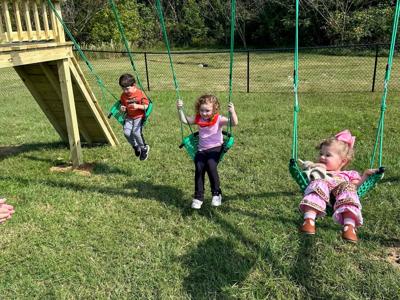One in 36 children are estimated to be diagnosed with autism spectrum disorder in the U.S., according to the CDC's Autism and Developmental Disabilities Monitoring Network.
As a developmental disorder, autism can impact how a person communicates, behaves and learns. With April being Autism Awareness month, local organizations are spreading awareness and helping others better understand people with autism.
“Autism is not a mental disability,” program director Heather Fulford with Growing Independence Behavioral Services said. “They can understand things; you just have to teach them in a different way than you do other kids who do not have developmental delays or anything like that.”
Autism awareness is also about embracing differences and helping individuals with autism and those who do not have autism better understand each other. Growing Independence Behavioral Services is a part of a wider organization called The Learning Tree, which offers statewide support for those with disabilities. Growing Independence focuses on specifically Applied Behavior Analysis (ABA) services.
“We implement behavior therapy to work on socialization, behavior, communication, all types of different skills for preschool aged kids,” Fulford said. “So, we're basically getting them ready to leave us and go to school. Whatever that school may look like, if it's just a general education classroom situation, if it's a special ed class, but we work on those different skills for about two years.”
In addition to therapy, Growing Independence also offers parent training. Fulford said they are with the child for just two years of their life, but the parent is with them for significantly longer. She said it’s important for parents to understand their child’s autism since it is specific to the individual.
Fulford said, to that point, it can be difficult to say certain signs to look for when it comes to deciding to seek a diagnosis. There can be certain tendencies like signs of being nonverbal, difficulty socializing with other kids, repetitive behaviors or disruptions to routines causing, what could be considered, meltdowns or shutdowns.
However, these are just some tendencies. Really deciding to seek a diagnosis is going to come down to knowing your kid — since autism presents differently for every person.
If a child is diagnosed, then they may come to Growing Independence by referral, and most ABA therapy will be covered by health insurance. Growing Independence has four clinics in the state: Anniston, Albertville, Montgomery and Mobile. Most kids from Tallapoosa County and Elmore County go to the Montgomery clinic.
Growing Independence creates a treatment plan every six months to set up goals for the therapy process. Fulford said there is a great need for more board-certified behavior analysts. They are the ones who develop treatment plans. Growing Independence is also hiring registered behavior technicians, who are the ones actually implementing the therapy.
“The industry right now is wide open,” Fulford said. “That is something that would be wonderful if somebody is interested. If they're interested in social work, special education, anything like that, this is another avenue of being in that same kind of field. We have a lot of social workers who have changed their majors to apply behavior analysis to become a BCBA.”
Additionally, The Learning Tree is a proud partner agency with the Lake Martin Area United Way.
“We really like to make the community aware of what we do and the children that we serve,” Fulford said. “We are just appreciative of all the support we get.”

